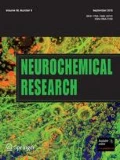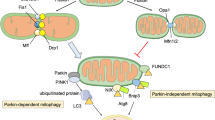Abstract
Apoptotic cell death pathways have been implicated in acute brain injuries, including cerebral ischemia, brain trauma, and spinal cord injury, and in chronic neurodegenerative diseases. Experimental ischemia and reperfusion models, such as transient focal/global ischemia in rodents, have been thoroughly studied and suggest the involvement of mitochondria and the cell survival/death signaling pathways in cell death/survival cascades. Recent studies have implicated mitochondria-dependent apoptosis involving pro- and anti-apoptotic protein binding, the release of cytochrome c and second mitochondria-derived activator of caspase, the activation of downstream caspases-9 and −3, and DNA fragmentation. Reactive oxygen species are known to be significantly generated in the mitochondrial electron transport chain in the dysfunctional mitochondria during reperfusion after ischemia, and are also implicated in the survival signaling pathway that involves phosphatidylinositol-3-kinase (PI3-K), Akt, and downstream signaling molecules, like Bad, 14-3-3, and the proline-rich Akt substrate (PRAS), and their bindings. Further studies of these survival pathways may provide novel therapeutic strategies for clinical stroke.
Similar content being viewed by others
Author information
Authors and Affiliations
Corresponding author
Additional information
Special issue dedicated to Lawrence F. Eng.
Rights and permissions
About this article
Cite this article
Chan, P.H. Mitochondria and Neuronal Death/Survival Signaling Pathways in Cerebral Ischemia. Neurochem Res 29, 1943–1949 (2004). https://doi.org/10.1007/s11064-004-6869-x
Accepted:
Issue Date:
DOI: https://doi.org/10.1007/s11064-004-6869-x




